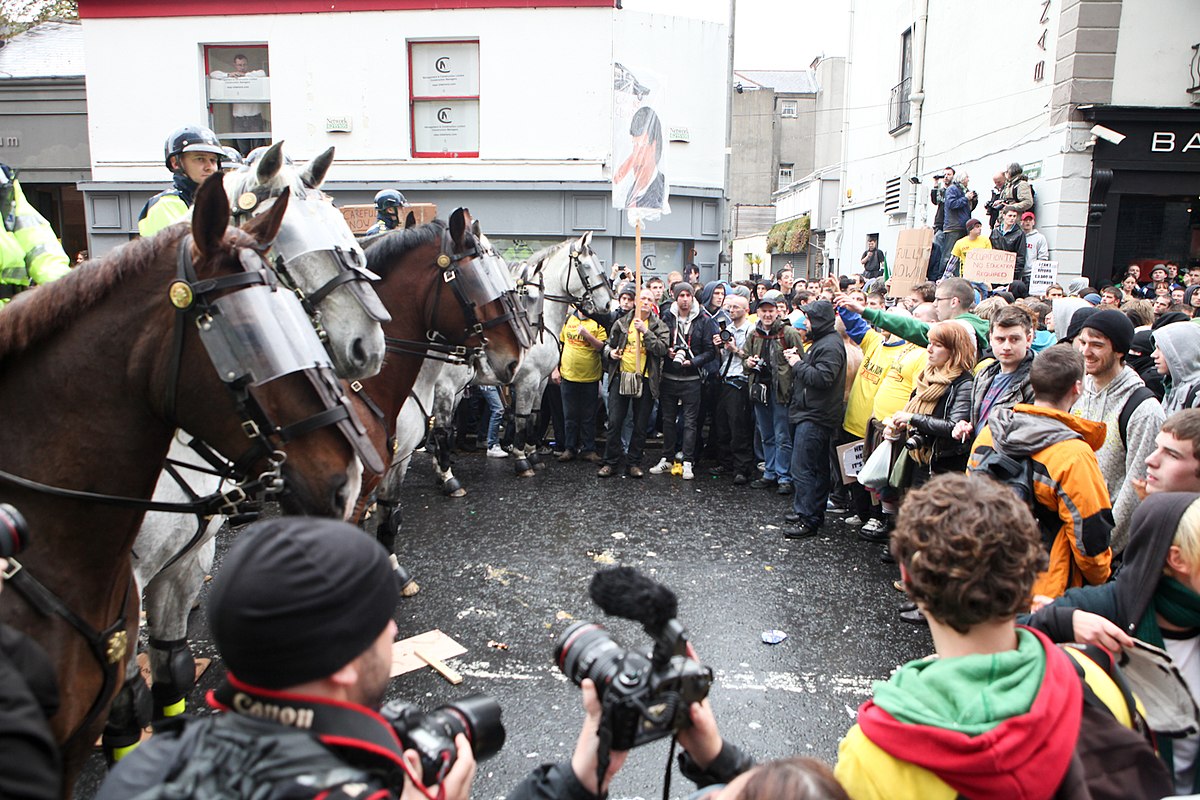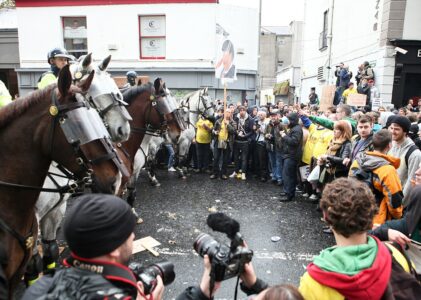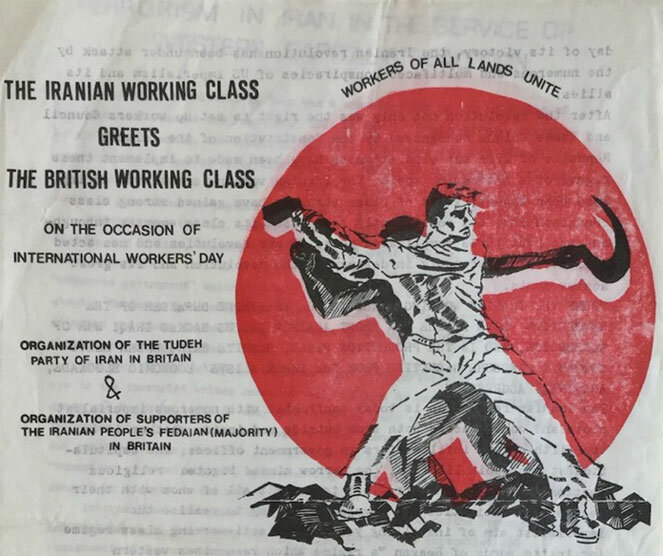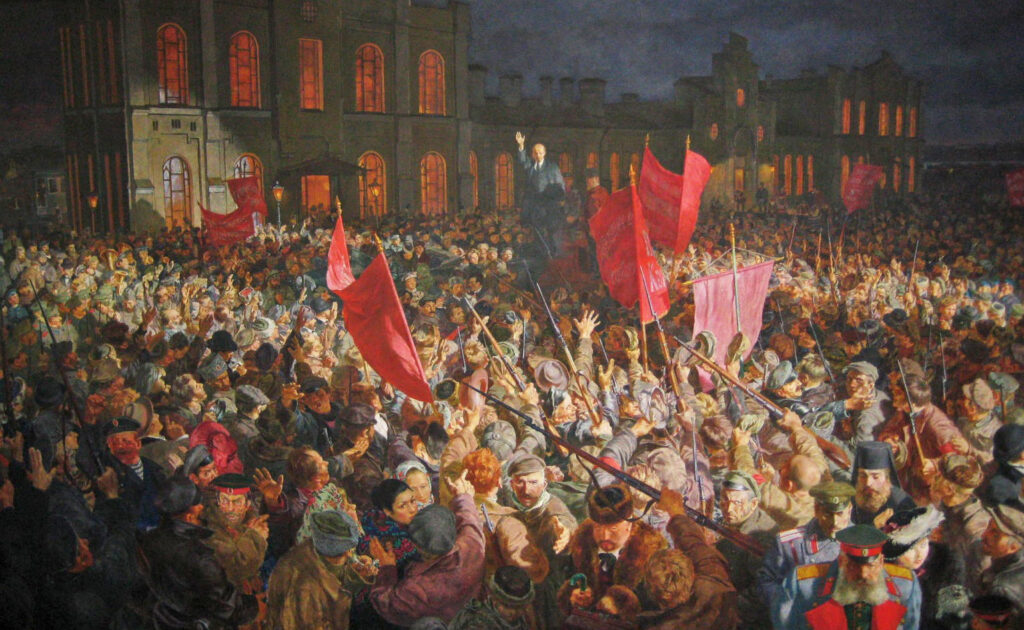By László Molnárfi
Sunday 27 October 2024
The closed-shop student union model has paradoxically led to an all-encompassing, yet strikingly unrepresentative model of democracy. It is a mirage of liberal philosophy, presupposing a magical, homogenous and apolitical unity between students. It does the bidding of university managers and the state to ensure that student unions are devoid of radical politics and to turn them into organisations invisibly occupied by the liberal mainstream. In this article, I will make the case from a left-wing perspective to abolish mandatory membership and replace it with voluntary association.
All student unions in the Republic of Ireland operate with mandatory membership. The generalised form of this is that upon enrolling in a third-level institution, the student automatically becomes a member of the student union. In the process, they pay within their student fees a small union due, which is redistributed to the student union by the university’s bureaucracy. Calls to abolish this have mainly come from right-wing circles, with ill-informed and reactionary campaigns targeting the wrong decision-makers (Roche, 2023). Other calls have arisen from the legal community, but these represent an obsession with form over content and are devoid of material analysis (Forde, 2018). There is a need for an analysis grounded in a practical perspective as to the outcomes of mandatory membership, keeping in mind the interaction of philosophy and politics.
This simple system has unintended consequences that are severely damaging to the ability of radical politics to emerge from within student unions. Rather than being a gift to the left, as the right claims, it is a curse. It needs to be re-conceptualized as a tool of liberalism to counter-balance socialist influence within the student movement.
The liberal conception of governance is that of pluralism. While other interpretations exist, this is the prevailing image that the ruling elite present. Under pluralism “there is not a dominant class or a set of institutionally based elites that has predominant power” (Domhoff, 2005), but competing interest groups, which ensure that power is so diffuse that it is in democratic hands. Arising from this interpretation, people organise themselves via various means, such as trade unions, student unions and community groups, which are bequeathed with the ability to interact with dominant powers, such as the state. In the eyes of the liberal, these interactions are authority-citizenry relations that take place on the so-called marketplace of ideas, under the auspices of a neutral state machinery which is pluralistic, tolerant and rational. The content of the interactions thereof concern itself with matters of policy, to be tweaked, hashed out and debated to a satisfactory conclusion. Pluralism tends to downplay the role of wealth and power, insisting on democracy through diffusion, and thereby promote the role of good policy. In other words, “the system is flawless, but the policy is adjustable” (Molnárfi, 2024).
This stands in opposition to interpretations of systems of domination, such as class power, relations and interests that are present in institutions.
“Neoliberal capitalism and its bourgeois democratic form presents itself not merely as flawless, but as the irreversible logic of social reality. By appearing as logic itself, it dissolves ideology, system and history, which cease to exist. In its place appears the one-dimensional obsession with authority-citizenry feedback. As such, we cannot speak of structural forces, such as the role of the profit motive in decision-making under capitalist economies, the vested interests of the haves to exploit the have-nots, nor can we speak of ideologies that drive these tendencies.” (Ibid).
If the student union accepts the liberal interpretation of society, then it will be forced to abandon systemic analysis in favour of “piecemeal inputs in pre-existing institutional channels” (Ibid). The denial of systemic analysis results in ineffective campaigning due to the inability to diagnose the capitalist logic behind the issues that students face. This, regardless of whether the union has a friendly or confrontational relationship with decision-makers, “seeks to undermine the union by stripping it of its ability to understand and work against oppressive structures in capitalist societies, trapping them in an eternal cycle of dead-end dialogue with authorities.” (Ibid). A depoliticised organisation is liberal and is content with participation in pre-existing inputs within, whereas a political organisation that has a socialist ideology may seek to change the system entirely.
The ideological hinterland of a student union that has an all-encompassing membership is liberalism. By reifying the student as an all-inclusive category whose interests need to be represented in the face of the university and the state, class analysis has already been eclipsed. Arising from therein, acts of representation will now take place pursuing the student interest, rather than the class interest. In tandem, the varying class allegiances of students are discarded. Then, if political ideologies reflect different class allegiances, then mutatis mutandi political allegiances are discarded. This reductionist approach then results in the tendency towards depoliticisation. Rather interestingly, a contradiction has arisen between the values of free association that liberalism espouses and the forcible amalgamation of students into a singular student union, negating itself. The dialectics reveal themselves insofar as that a moment of liberalism has produced an instance of its own negation. The movement from the theory of liberalism to its practice produces this moment, precisely because liberalism does not recognize class domination in theory but supports it in practice.
By the automatic membership of thousands of students, the order of the day becomes the pursuit of representation for all. If representation for all is the mandate, then it follows that there must be a need to cater to the lowest common denominator, which turns out to be policy-making within a liberal-democratic representative system. This results in the rise of a ‘neutral union’, which, in its strive towards representation for all, discards politics. The aspect of politics which is state-citizenry interaction is presented as the whole when it is just a part in the whole, since “expressing opinions on political parties, systems and ideologies.” (Ibid) is forbidden. This represents “an ideological imposition that restricts the union at its singularity” (Ibid). In certain cases, transcending from the realm of a cultural pressure into a legal actuality, this has also been recorded in the constitution of student unions via apoliticism clauses.
The eclipse of politics in favour of an imagined, liberal and apolitical unity is thus complete. The artificial ‘student interest’ which has been reified as a political subjectivity denies questions of revolution. The liberal framework is presented as the fundamental and irreversible logic of social reality by denying the ability to hold opposing ideological thought. Thus, the existence of class society is denied and the class interest is purposefully put aside. Since “The ensemble” of “student unions are not independent actors, but are themselves extensions of the state apparatus and continuously assert their cultural hegemony over student activism by weight of their social power situated in capitalist power structures” (Molnárfi, 2023a), the development of the political consciousness of students is arrested. A socialist student movement cannot be built on the basis of liberal unity. It is built on schisms, the development of political consciousness amongst the student body and its self-organisation into groups that represent its various ideologies. The liberalising incentive is a process of the ruling mode of production to subsume student unions into itself by preventing the development of political consciousness.
Without a single conscious act on the part of the ruling class, capital has already ensured its influence within the student union. A subjectivity has been established that influences outcomes. This is an ideological hinterland surrounding the student union which acts as an “invisible barrier constraining thought and action” (Fisher, 2009), on top of which a series of economic incentives push the student union to become co-opted by the third-level institution and the state. These economic incentives range from league tables, careerist motivations to interactions in Bourdieu’s field theory via joint projects with the authorities to the neoliberal underfunding of academia pushing unions and the university closer (Molnárfi, 2023b). They then present themselves as apolitical service and event providers rather than unions that rely on collective action to deliver change (Ibid). We must thus begin to imagine the student union as part of an assemblage of a larger liberal-bourgoise machine. The student union becomes a mini-state machine, reflecting not only “the dissolution of its independent values into the hegemonic image of the ruling mode of production”, but its territorialization by capital (Ibid). The student union becomes the liberal vanguard of the masses, spreading liberal context, language and power.
It is no surprise that the structures of the student union mirror that of liberal-parliamentary democracy, with constituency representatives, a senate, an executive and independent judiciaries. The final result is that upon entering the hall of the senate meeting of the student union, and proposing motions to be debated, voted on and passed as a ritualistic expression of liberal democracy, the student is expressing the desire for change in dominant terms, in relation to the bureaucratic machine of the university administration or the state office, to which the executive will inevitably bring whatever policy was accepted and lobby therewith. There may be protests too, should the lobbying fail, but it will have already been sanitised of any holistic transformative power via ritualised liberalism. If the desire of capital is to block the formation of alternative subjectivities and the creation of autonomous war-machines (Robinson, 2010), then it is swiftly achieved by the subjectivity-generation and territorialization of student representation by the student union.
The illusion of democracy is established by the right to propose motions, vote and ask questions of union leadership to hold them accountable, but the ideological choice has been already made. The elevation of the ‘democratic principle’ and the sidelining of the ideological is a mistake, as it “demonstrates the theoretical inconsistency and the practical deception of a system which pretends to reconcile political equality with the division of society into social classes determined by the nature of the mode of production” (Bordiga, 1922). Therefore, any action within the boundaries of the student union will not only be reformist but necessarily reproduce liberal reality and its conditions of existence.
If power is diffuse and able to “generate reality, domains of objects and rituals of truth” (Foucault, 1991) and is “exercised over free subjects” (Dreyfus, Rabinow and Foucault, 1982), then the student union embodies this principle by choosing liberalism without a single vote ever having been held on the matter. In the same way, the state maintains the illusion of democracy, with periodical elections for representatives, while maintaining class domination. By design, neither system can be re-directed for the re-production of other realities, safe for a fundamental alteration. Much like the U.S Constitution’s claim to the right of revolution that would immediately result in death or arrest if attempted in practice, the student union’s insistence that it speaks truth to power is meaningless because its structure is designed to replicate present conditions, it being a war-machine captured by the state and its energies redirected to capital’s ends.
The parallels between the systems are a result of the interaction of organisms under the capitalist mode of production, because the “corporate university copies the state structure with its rigidity, bureaucracy and autocracy. The student union copies the university” (Molnárfi, 2023b). The eternal reappearance of rigidly-defined, lookalike and vertical anti-democratic structures proves that liberal capitalism, far from being democratic, is a special type of dictatorship, that of the bourgeois.
This philosophical infestation, the ‘original sin’ of automatic membership, lies at the root of a series of topsy-turvy phenomena which consequently arise.
There are those who claim that automatic membership makes for stronger unions. This is a classic mistake. Once again, this arises from the liberal-idealistic approach that mistakes the form for the content. The claim that thousands of students are signed up to the union is mistaken for the actuality of membership. In essence, student unions have all-inclusive membership in formal terms only, not in real terms. The third-level institution to which student unions are attached keep a complete list of students. There are two separate scenarios. Either this database is not transmitted to the union. The union communicates with students through aggregate mailing lists. Alternatively, the database is transmitted via a data-sharing agreement. If the database is transmitted, the student union can communicate with students via individual emails aggregated. These approaches are enshrined in the third-level institution’s statutes, policies and partnership agreements it may have with the student union, and is backed by national legislation.
In both cases the automatic membership introduces an element of passivity into the system. This is unlike when trade unions sign up their members. The database is created. Yet, that database will reflect an accurate number of enthusiastic union members, reflecting an active approach. It appears that the student union has been granted the right to claim representation, without having earned that representation. There arises a further two phenomena in addition to the ideological pressure of all-inclusive representation.
- Crisis of Legitimacy: The share of students who engage in the politics of student unions, measured by elections in 9 of them in the 26 counties, hovered between 4% to 19.6% in 2022/2023. The arbitrary comparison created between the students engaging and the students supposedly members of the union creates a crisis of legitimacy that can be exploited by the authorities to ignore students. If the union plays nice with the authorities, it receives praise and recognition. If the union takes on a more adverse attitude, it is dismissed as unrepresentative. The same would never happen to a trade union with voluntary membership because no arbitrary gulf exists between who the organisation claims to represent and who it actually represents.
- Passivity: Automatic membership creates illusions that power lies in the formal recognition of authority to represent. This is untrue. Power to effect change on a local (university) or national (state) level lies solely in the ability to mobilise students to actions that threaten, or actually damage the reputation and finances of the powers that be. As a result of there being no recruitment mechanism, but passive sign up, there is a total lack of mobilising infrastructure. The entire system encourages passivity – and this is compounded by the fact that as a result of economic incentives, student unions tend to present themselves as event and service providers rather than militant campaigning groups. A set of motions that trade unions partake in, that which is the recruitment ritual, is thus missing. There arises a Derridean autoimmunity (Rae, 2022) in the student union, in which the act of appearing to represent all students is taken for the actuality of representing and insisted on for reasons of maintaining power, and in the process true organising power is eroded.
Whenever student unions engage in the political realm for progressive reasons beyond the neo-liberal status quo, the instant reaction is that they have to represent all students. In this way, automatic membership is the conservative’s best friend because reactionary ideologies can be justified by alluding to liberal ideals. Rather than competing on the basis of politics, a hyper-moralising paradigm is created in which minority rights, specifically the right to free (dis-)association, have been trampled upon. Before a political idea is even debated, it is shut down. If the student union is funded per each student, and is the officially-recognized representative body by the third-level institution and the state, then this interaction between all-inclusive representation and the need to depoliticise combined with the profit motive is an effective deadlock on radical change. Historically, it has been used to argue against political slogans advocating for changes in the government and systems with great success, as well as to block individual campaigns like B.D.S, abortion rights and support for striking university workers with less success.
The point is not to enable the student union to take political stances which a minority do not agree with, as that would indeed be unfair, but it is that mandatory membership is a significant obstacle to the development of political consciousness. Militant leadership has overcome it, but the general tendency is that it acts as too strong of an ideological force to prevent radicalism. Socialist consciousness is grown via active recruitment by agitators into revolutionary organisations, a process that is diametrically opposed to the passive reification of the student as an all-inclusive, apolitical and monolithic block, and their shoehorning into the student union.
The creation of the paradoxically exclusionary yet all-encompassing representation arises from the refusal to acknowledge politics. In its place, we should abolish mandatory student unions, and implement the French model. This enables voluntary associations with defined political ideologies, and indeed those presenting as apolitical, to run slates to university governance bodies. The seats are proportionally divided amongst the voluntary associations following the share of the vote garnered in a student-body wide election. These voluntary associations act as representatives of the students divided among political lines as well as organise other forms of political action. They are not responsible for service or event provision. This would be a totalizing politicisation which would acknowledge politics while allowing space for self-organisation to mushroom, and would greatly benefit the socialist left whereas the reactionary conservatives would lose massively in the battle of ideologies when it comes to an open debate. The formation of subjectivities that grassroots voluntary groups would allow is exactly the type of war-machine that we need to put into motion to defeat capitalism. It is important to outline that what is being proposed is strictly-defined so as to enable the development of political consciousness; voluntary associationism has been used to disempower student unions in some countries such as Australia due to its particular implementation, but this not a universal feature thereof. Despite the discourse being dominated by reactionaries, this is not the first time that a demand for the ability to have an explicitly political mandate rather than just the ‘student interest’ has been made by socialist radicals in student unions (Buddeberg, 1968).
The rigidity of the Irish assemblage of youth representation is a stark reminder of the amalgamation process that neo-liberalism has resulted in, with student unions imposing a de-politicised version of advocacy. These monoliths serve to sustain the status quo by substituting political advocacy for a-political advocacy. They are pushed into it unwillingly, via their structures that offer no real ideological choice. The implementation of voluntary associationism for student representation would fracture the assemblage and force engagement with varying political ideologies. As opposed to the tendency to promote an ignorance of politics, it would enforce a totalising politicisation. Therefore, it would force an opening of the political horizon towards revolutionary questions, offering radicals a platform to penetrate.
Reference list
Bordiga, A. (1922). The Democratic Principle . [online] www.marxists.org. Available at: https://www.marxists.org/archive/bordiga/works/1922/democratic-principle.htm.
Buddeberg, M. (1968). Manfred Buddeberg: The Student Movement in West Germany (Summer 1968). [online] www.marxists.org. Available at: https://www.marxists.org/history/etol/newspape/isj/1968/no033/buddeberg.htm.
Domhoff, G.W. (2005). Who Rules America: Alternative Theories. [online] whorulesamerica.ucsc.edu. Available at: https://whorulesamerica.ucsc.edu/theory/alternative_theories.html.
Dreyfus, H.L., Rabinow, P. and Foucault, M. (1982). Michel Foucault : beyond structuralism and hermeneutics. Chicago, Ill: University Of Chicago Press.
Fisher, M. (2009). Capitalist Realism: Is There No Alternative? Winchester: Zero Books.
Forde, E. (2018). No ‘I’ in Students’ Union: The Constitutional Right to Opt-Out. [online] Trinity College Law Review (TCLR) | Trinity College Dublin. Available at: https://trinitycollegelawreview.org/no-i-in-students-union-the-constitutional-right-to-opt-out/ [Accessed 19 Jun. 2024].
Foucault, M. (1991). Discipline and punish: the Birth of the prison. Penguin Books.
Molnárfi, L. (2023a). In a world which really is topsy-turvy, the true is a moment of the false. [online] Aontacht Media. Available at: https://aontachtmedia.ie/2023/07/05/in-a-world-which-really-is-topsy-turvy-the-true-is-a-moment-of-the-false/ [Accessed 17 Jun. 2024].
Molnárfi, L. (2023b). Photo-ops and Goodie Bags: Co-Optation of Student Unions. [online] Trinity College Dublin Social and Political Review. Available at: https://www.tcdspr.com/copy-3-of-article-one-1 [Accessed 17 Jun. 2024].
Molnárfi, L. (2024). Depoliticising the Students’ Union is a Right-Wing Attack on Students. [online] universitytimes.ie. Available at: https://universitytimes.ie/2024/02/depoliticising-the-students-union-is-a-right-wing-attack-on-students/ [Accessed 17 Jun. 2024].
Rae, G. (2022). Derrida, autoimmunity, and critique. Distinktion: Journal of Social Theory, pp.1–21. doi:https://doi.org/10.1080/1600910x.2022.2039739.
Robinson, A. (2010). In Theory Why Deleuze (still) matters: States, war-machines and radical transformation | Ceasefire Magazine. [online] ceasefiremagazine.co.uk. Available at: https://ceasefiremagazine.co.uk/in-theory-deleuze-war-machine/.
Roche, C. (2023). Campaign Launched to Reform Students’ Union. [online] universitytimes.ie. Available at: https://universitytimes.ie/2023/11/campaign-launched-to-reform-students-union/ [Accessed 19 Jun. 2024].




